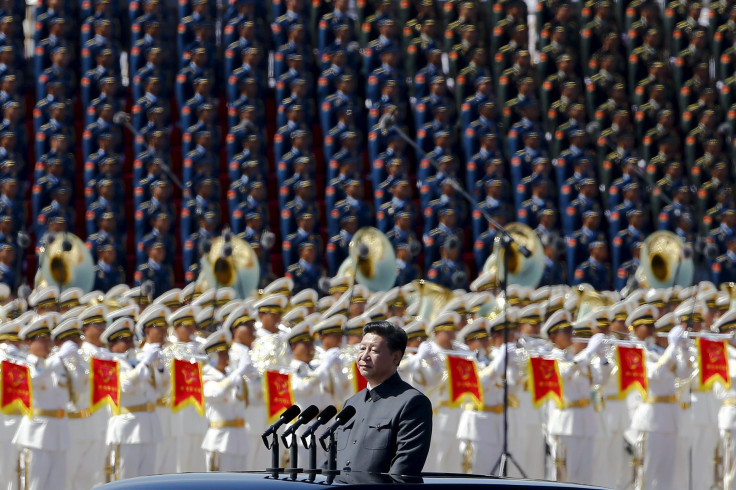China’s Anti-Corruption Campaign: Top Beijing And Shanghai Officials Under Investigation As Probe Deepens

SHANGHAI -- China’s ongoing anti-corruption campaign has for the first time brought down senior officials in the country’s two biggest cities, Beijing and Shanghai, in what analysts say is a further sign of the deepening of the crackdown. Shanghai Vice Mayor Ai Baojun and Beijing Municipal Deputy Party Secretary Lu Xiwen were detained on suspicion of serious violations of discipline, a party code word for corruption, state media said Wednesday.
Few details were given about the case of Lu, who had previously called on officials to stay close to the grassroots, and was recently elected as president of the Beijing Volunteer Service Federation. Ai, however, was a high-profile Shanghai official who was head of the management committee of the city’s pilot Free Trade Zone, where a number of China's proposed financial reforms are being piloted. He was also a director of a tourism zone which includes the city’s new Disneyland resort, due to open next year -- and was seen in public as recently as last Friday at an Industrial Fair.
No details of Ai's alleged misdemeanors were given, but his detention may be linked to corruption during his previous spell at Shanghai-based Baosteel Corporation, one of China’s largest state-owned steel makers, the South China Morning Post reported, quoting a local government source.
His detention follows speculation that Shanghai officials could be caught up in the anti-graft campaign -- which until now had spared top leaders in China's financial capital -- after an investigation into corruption in the city by central officials last year.
Ai is the highest-level Shanghai official to be detained since the city’s former party secretary Chen Liangyu in 2006. Chen, a member of China’s ruling politburo, was later sentenced to 18 years in jail for fraud, abuse of power and taking bribes -- though he remains popular among some Shanghai citizens, who argue that he was the victim of a power struggle.
Shanghai’s Communist Party Secretary Han Zheng was unusually quoted by state media as describing Ai’s fall from grace as “heartbreaking.” However, he said the local leadership “resolutely supported” his detention, and told local party officials that every party member “should reflect deeply on and learn from the case and take it as a grave warning. Government officials must be role models and regulate themselves, their relatives and staff.”
Earlier this year, Shanghai announced a pilot program banning the family members of senior local officials from taking any role in business -- in an attempt to reduce the potential for corruption. Officials say corruption routinely involves officials’ family members -- and President Xi Jinping has said that stamping it out is key to strengthening the party’s legitimacy at a time when China faces a number of economic and social challenges.
The anti-corruption campaign has generally proved popular among China’s public, and has brought down several senior officials, including China’s former security chief Zhou Yongkang. However, some observers have warned that the ongoing arrests of officials around the country also serve to highlight deep-seated problems in the party and system. Wang Qishan, the head of the crackdown, acknowledged as much in June, saying the campaign had inevitably “hurt the organization and... caused damage to the party’s image.”
Ai’s arrest for example, is the second damaging blow this year for the Shanghai Free Trade Zone, seen as an important testing ground for future market-oriented reforms: its former deputy head Dai Haibo was detained in an anti-corruption investigation earlier this year.
However, President Xi said on his recent state visit to the U.S. that the anti-corruption campaign would continue -- and denied it was a politically motivated crackdown designed to get rid of key rivals, as some critics have argued, saying in a speech that "in this case there is no 'House of Cards,'" -- a reference to the U.S. TV drama about political intrigue starring Kevin Spacey.
The party recently published stricter new rules for party officials -- banning them from playing golf, being members of private clubs -- and also preventing them from criticizing or questioning party or government policy in public. Anti-corruption chief Wang warned in a recent article that officials' laziness, remoteness from the people and “passive corruption” risked shaking the party’s ability to govern -- and its legitimacy.
In a sign of the wide-ranging nature of the campaign, officials on Wednesday also announced the expulsion from the Communist Party of the former executive vice president of the Chinese Academy of Governance, a body which trains top level officials and civil servants. The official, He Jiacheng, is accused of graft and hindering government investigations, state media said. He, who held a rank equivalent to a government minister, had been under investigation since last year. He was accused of taking bribes, violating party rules by “frequenting private clubs” and showing "no signs of self-discipline.”
© Copyright IBTimes 2024. All rights reserved.






















